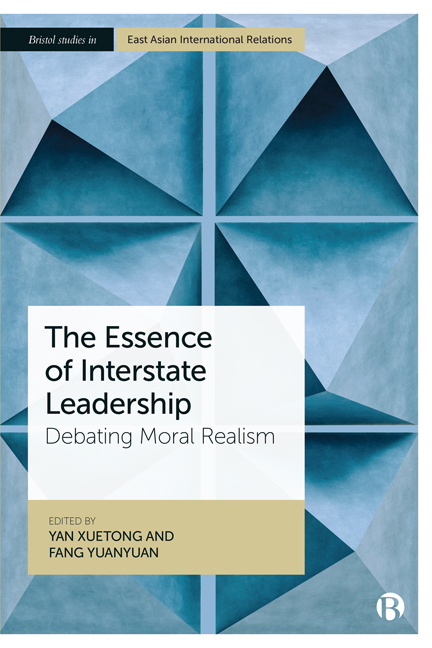Book contents
- Frontmatter
- Contents
- List of Abbreviations
- Notes on Contributors
- Preface
- 1 Interstate Leadership, Moral Realism, and their Critics
- 2 IR Moral Realism as a Universal Theory
- 3 Moral Realism as an Alternative Approach to the Agent-Structure Problem
- 4 Prospects, Promise, and Limitations of Moral Realism
- 5 Ideal Morality and Realist Interest of Moral Realism
- 6 The Conception of Morality in Moral Realism
- 7 Moral Realism and Hegemonic Transition
- 8 Innovation of Moral Realism and Dialogue with It
- 9 Moral Realism and Sino-American Relations
- 10 Moral Realism on Interstate Leadership in Response to Critics
- Appendix 1 Written Discussion between Rajesh Rajagopalan and Yan Xuetong
- Appendix 2 ‘Chinese School’ as an Inappropriate Title
- Selected Bibliography
- Index
7 - Moral Realism and Hegemonic Transition
Published online by Cambridge University Press: 18 January 2024
- Frontmatter
- Contents
- List of Abbreviations
- Notes on Contributors
- Preface
- 1 Interstate Leadership, Moral Realism, and their Critics
- 2 IR Moral Realism as a Universal Theory
- 3 Moral Realism as an Alternative Approach to the Agent-Structure Problem
- 4 Prospects, Promise, and Limitations of Moral Realism
- 5 Ideal Morality and Realist Interest of Moral Realism
- 6 The Conception of Morality in Moral Realism
- 7 Moral Realism and Hegemonic Transition
- 8 Innovation of Moral Realism and Dialogue with It
- 9 Moral Realism and Sino-American Relations
- 10 Moral Realism on Interstate Leadership in Response to Critics
- Appendix 1 Written Discussion between Rajesh Rajagopalan and Yan Xuetong
- Appendix 2 ‘Chinese School’ as an Inappropriate Title
- Selected Bibliography
- Index
Summary
Croesus, the king of the Lydian Empire, was quite euphoric after he had received the Delphic Oracles’ response about how to deal with the rising menace of the Persian Empire. If Croesus goes to war, Pythia said, then he will destroy a great empire. Yet, what the oracle did not clarify was the name of the empire that was to be destroyed. Ignoring the wise counsel of his advisors on the ambiguity of the Delphic prophesy and the inherent risk in war, wishful Croesus jumped into conclusions. He imagined that his own Lydian empire would be the victorious one in a war against the rising Persian Empire of Cyrus the Great. It did not turn out that way: Croesus was crushed, his own empire annexed. Herodotus, the first of the great Greek historians, attributed to the successful leadership of Cyrus and the failed leadership of Croesus the hegemonic shift from the Lydian to the Persian Empire in the Eastern Mediterranean. Herodotus further submitted that, he recorded the histories of both small states and great states, for ‘many states that were once great have now become small; and those that were great in my time were small before’. In a similar spirit, Guan Zhong (管仲), the prime minister to Duke Huan of Qi, declared that ‘if a state is huge but the achievements of its government are insignificant, the state will become insignificant. If a state is small but the achievements of its government are significant, the state will become significant’. Stories from early antiquity must always be read with a grain of salt, yet history abounds with statesmen making fateful strategic decisions.
The moderns, however, particularly those of the triumphant post- Cold War era, have opted to conform to a rather algorithmic view about national success. There is to them a perfect polity – a software of governance – which if it was to be downloaded and installed, national success would automatically ensue. Indeed, by 1991, scholars and politicians alike ascribed to a triumphal school of thought prophesizing the end of history built on the socioeconomic software that the great victor of the Cold War, the US, had provided.
- Type
- Chapter
- Information
- The Essence of Interstate LeadershipDebating Moral Realism, pp. 113 - 142Publisher: Bristol University PressPrint publication year: 2023



